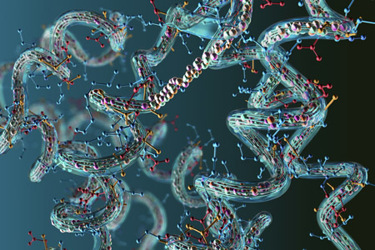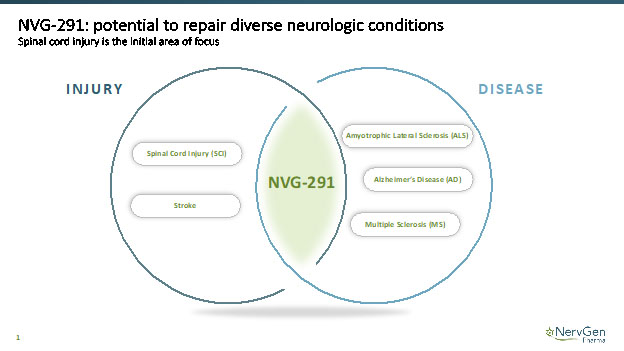"Hiring" A CDMO For A Peptide To Repair Nerve Damage

By Louis Garguilo, Chief Editor, Outsourced Pharma

A few months ago, in the investor section on the company website, clicking on “download presentation” got you a single slide that said, “coming soon.”
Come to find out, NervGen had already done an IPO on the Toronto Stock Exchange (NGEN.V), and has a devoted group of investors to go along with a quickly moving lead compound. (The company is also listed on the OTCQX as NGENF.)
And the website has now been updated.
The 2018-founded organization also has a new CEO. Michael Kelly’s been on the job about three months.

That first program he’ll help steer to potential commercialization is NVG-291, a treatment that enables the nervous system to repair itself following damage, whether due to injury or disease.
NVG-291 has been moving steadily through development and in the clinic. NervGen’s main outsourcing partner is Piramal, who makes the API in India. (More on that relationship below.)
The potential of NVG-291 is demonstrated in this graphic.

While things are moving relatively quickly at NervGen, Kelly took the time to speak with me about his outsourcing experiences, strategies, and best practices.
Family Affair
NervGen’s initial target indication is spinal cord injury.
NVG-291will enter a Phase 1b/2a proof of concept study, with enrollment to commence this year. NVG-291 is a peptide, and a first-in-class neuroreparative therapeutic administered by injection under the skin.
The company was founded by Harold Punnett, whose daughter-in-law, after suffering a fall, became a paraplegic.
A dentist by training, Punnett searched the globe for help, and came across some work done by Jerry Silver of Case Western Reserve University. Punnett contacted Silver and discussions turned into a license of Silver’s technology from Case Western, the basis of the company’s formation.
Together with co-founder and Board Chair Bill Radvak, Punnett also found a group of investors in Vancouver to build out an organization to advance the technology – with an all-outsourced model. Today, NervGen has 11 employees.
What’s Kelly and NervGen’s development assignment? “It comes out of academia as a molecule. You have to turn it into a pharmaceutical,” Kelly says with a wry smile.
And the investors in Canada felt the best way to accomplish that was to fund the company with an IPO.
“Quite honestly,” Kelly says appreciatively, “that group of investors have been loyal to the company since.”
From the beginning, then, NervGen has been all about building relationships – first with scientists and universities and investors.
Kelly says everyone in the company now needs to extend that feeling to their external service providers to continue its trajectory.
The “Hiring” Process
“Our philosophy on outsourcing is that this is an extension of the company,” Kelly says. “Just like you're hiring an employee internally, you find the external expert in the functional area that you're interviewing for.
“If I needed to hire somebody internally in regulatory, I would develop a profile of the professional and a job description, talk to recruiters and other sources, and go after that exact person.
“We use that same process when we're looking for experts outside of our company.”
A key component in the process, he adds, is a “resident expert” within the organization to take charge of that hiring.
“Your internal expert should feel tasked to hire like they would internally, talk the language of the project and the needs, and just like a supervisor would to an employee, hold them accountable,” explains Kelly.
“That's what a good working relationship is. You set specific goals and objectives, and monitor progress. It's the same process, only some people are internal and some aren't.”
For the API of compound NVG-291, Vancouver-based NervGen hired the professionals at Piramal in India.
India For Peptides
Kelly says the two professionals at NervGen responsible for CMC and regulatory performed an exhaustive search for CDMOs expert in peptide manufacturing.
“NVG-291, being a cell-penetrating peptide with 35 amino acids in length, limits the scope of who has this expertise,” he says. “The CDMO absolutely must have the requisite technology. So step one was finding the experts in peptides to hire.”
About half a dozen companies gained consideration.
“Step two was identify scalability,” says Kelly. “We’re moving from phase one into phase two, and hopefully phase three. They needed a track record demonstrating the ability to scale.”
Next, there had to be a high degree of transparency.
“They're working for us on the other side of the world. We need an open dialogue and an open line of communication at all times.”
The final must-have: “They had to be willing to commit to a long-term partnership.”
“We didn't want a small, fee-for-service partner to go project-by-project,” Kelly says. “We wanted somebody who could learn with us along the way. That’s why you look for all of the items listed on your ‘hiring paper’ when you're selecting a partner.”
Trust The Process
That hiring paper can include a “partner matrix” listing and comparing the series of attributes necessary for success.
But while Piramal “checked the most boxes,” says Kelly, the most important part may have been the personal connection – “a connection of personalities and people.”
“There's a trust bond that's built throughout this process. So they do have the experience, they have strong analytical capabilities, they have the ability, they have quality, they have the ability to reduce cost of goods over time, and they had those personal attributes.”
In fact, Kelly says in preparation for our discussion, he asked his colleagues what the final decision ultimately came down to?
“They said, expertise and relationships. Those two things.”
Expertise, Kelly admits, is “a big, broad bucket of attributes” that are variable, but it also includes trusting the CDMO will be able to execute on a high level.
In reality, he says, you are working outside the organization and geographically distant. That personal connection bridges those gulfs.
“Our internal team continues to feel very comfortable. Piramal has been a good company to work with. They own technology we don't have internally. We’re relying on them to help us make our product better.”
